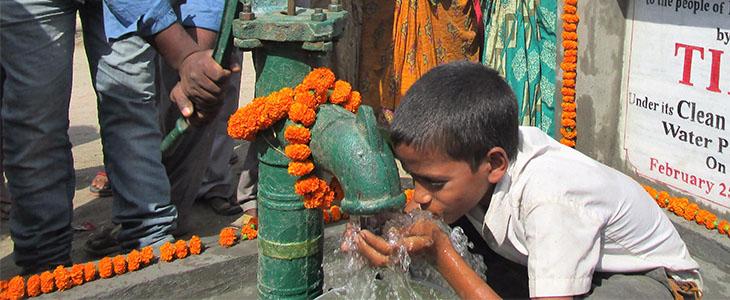There are still places in the world where people have never heard the name of Jesus. This is the case for much of the state of Bihar in Northeast India. But something incredible is happening there — people are rapidly coming to Jesus. Here’s how.
Spreading the gospel in Bihar all starts with tangible love and a simple analogy. But to grasp how profound this is, you first have to understand the context.
In Bihar, there are over 101 million people who have never heard of Jesus. And there also isn’t much infrastructure in place to get to all those people — most of whom live in remote, rural villages. There are rough dirt roads, a lack of sanitation, and in most places, people are drinking dirty water.
How do you even begin working in a place like this? You start with clean water.
READ: Justice and Mercy for the Poor (Including Us)
To bring the gospel to the unreached, Jesus’ Economy — the nonprofit I lead —sponsors indigenous church planters in Bihar. We have four church planters in the field right now. But before the planters even begin telling people about Jesus, they approach community leaders and ask what their needs are. Clean water is almost always the first response, because water-borne illnesses and dehydration are leading causes of death.
Through our church planters, village elders can submit an application for a clean water well. Jesus’ Economy then sponsors the requested water well, which is inaugurated with a celebration by our local church planter.
Bihar is an arid region, not that different the region Jesus lived in. In this context, Jesus said:
“Let anyone who is thirsty come to me and drink. Whoever believes in me, as Scripture has said, rivers of living water will flow from within them” (John 7:37–38 NIV).
A portion of this passage is inscribed in Hindi on a marble slab by every water well we drill. Each slab says in Hindi, “Jesus said, ‘I am the living water.’” This becomes the entry point for church planters to explain the love of Jesus and who he is as a person. Then when people ask, “Who provided this well for us?” The response is, “Jesus and Christians.”
In another passage, Jesus says to a Samaritan woman at a well:
“If you knew the gift of God and who it is that asks you for a drink, you would have asked him and he would have given you living water. … Everyone who drinks this water will be thirsty again, but whoever drinks the water I give them will never thirst. Indeed, the water I give them will become in them a spring of water welling up to eternal life” (John 4:10, 13–14 NIV).
For this reason, each water well we drill in Bihar is named, “Jacob’s Well,” after the passage of Jesus and the Samaritan woman at the well (John 4:1–42). This passage ends with the Samaritan woman, a marginalized individual, telling others about the love of Jesus.
At the end of the story of Jesus and the Samaritan woman, we’re told that the people in the woman’s village said, “We no longer believe just because of what you [the woman] said; now we have heard for ourselves, and we know that this man really is the Savior of the world” (John 4:42 NIV). This is like what we’re experiencing in Bihar, India.
In Bihar, indigenous church planters are bringing the gospel to the outcast and marginalized — those who are deemed as unimportant and the lowest of the low, the Dalit (untouchable) caste. In this context, we’re bringing the love of Jesus in a tangible and real way. We’re telling people of the equality, love, and freedom Jesus offers.
READ: The Power of Going First
I’m constantly amazed by what God has done in the hearts of people around the world who have joined our movement. It’s miraculous that people from across the world would sponsor a water well for people they don’t know. It’s also miraculous that people from across the world would sponsor a church planter for that same village.
But the people of Bihar are also seeing miracles in their very lives; they’re experiencing physical healings and the physical power of clean water. And when Jesus comes to town, people come out to see him and believe.
Once we have met the physical need of clean water in Bihar, we can address the spiritual needs of the people. I believe this is the model of how we should bring the love of Jesus. It’s not just the spiritual freedom of Jesus that people need; they also need their physical needs met. God has called us to both spiritually and physically renew communities.
This is often called a holistic approach — where we are first caring for the physical health of people and then introducing them to the spiritual health Jesus can offer. If this is then combined with economic development, in the form of job creation, we could transform an entire economy — physically and spiritually. That sounds like Jesus’ economy to me.
Imagine what could be in Bihar if this was multiplied — if we could bring the gospel in its full form to every last unreached person there. Imagine what could be if we could do this around the world.

